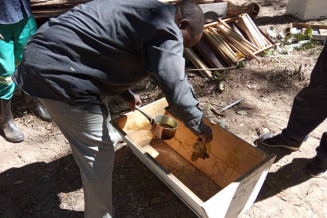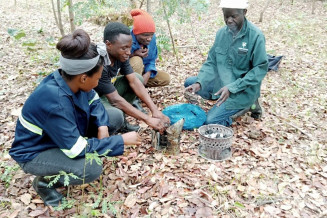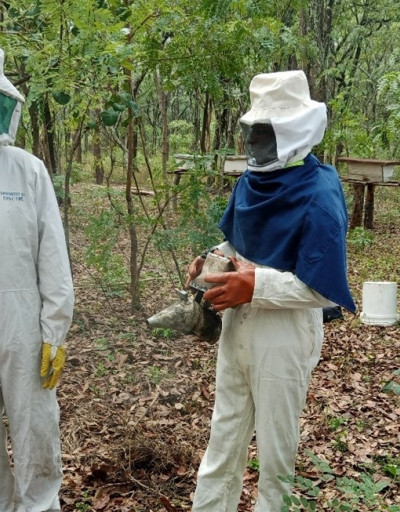Walking along a path through the forest that surrounds Zambia Forestry College, you might suddenly find yourself immersed in the sound of bees buzzing. Fortunately, there is nothing to fear as your attention will shift towards students and teachers from Zambia Forestry College and Mwereka Combined School, beekeepers, and members of the local community who are setting up an apiary, also known as a collection of beehives. They are learning about how beekeeping can enhance environmental protection of the forest.
The Mwekera National Forest was strategically designed to be a buffer for the Kafue River which today is under extreme pressure from harmful human activities: construction of illegal settlements, charcoal manufacturing, weak environmental governing policies, lack of quality education, and unsustainable farming practices.
Generally speaking, southern African forests are threatened by unsustainable forest consumption, the loss of forest cover, and the lack of skills and knowledge to preserve their resources and biodiversity. Engaging students, teachers, forestry agents and local communities at large, is key to protecting their environment. Forests are not only the lungs of our planet, but also home to the rich biodiversity that allows for the survival of local communities.

This is when Ruth Mulenga, Edgar Bowa, and Musunke Chisenga, from the Zambia Forestry College, decided to step in and carry out a change project focused on beekeeping under the UNESCO Sustainability Teachers Programme, a UNESCO-led capacity building initiative for teacher educators on Education for Sustainable Development in southern Africa. The Zambia Mwekera Beekeeping Educational Forum aims to raise awareness on sustainable development; reduce poverty; enhance household food security; and create strong relationships among the involved stakeholders.

Since the establishment of Zambia Mwekera Beekeeping Educational Forum, the local community has continued to discuss the benefits of investing in beekeeping both for household income and protecting the environment.
Zambia Mwekera Beekeeping Educational Forum is driven by the idea that learning sustainable practices and vocational skills can deter the community from devastating the forest resources needed to live sustainably. Education for Sustainable Development (ESD) is thus at the heart of this field project. ESD seeks to provide learners of all ages with the knowledge, skills, values, attitudes and power to address interconnected global challenges such as climate change, biodiversity loss, unsustainable resource use and inequalities.

Beekeeping helps people in the Mwekera area, the majority being small-scale farmers, to increase their financial security. They have also adopted more sustainable livelihoods, based on the knowledge and skills they have acquired in apiculture. From being consulted on project’s roadmap to setting up apiaries, the beneficiaries have been inspired to think differently about their environment and sustainability.
The one-hectare area is now completely protected from human disturbances, thus enhancing biodiversity conservation, and restoring the nearby Kamatebela stream. Furthermore, the creation of a modern apiary with an onsite class promotes teaching and learning in geography and sustainable development. Through an ESD-centered approach, pupils from nearby schools and college staff and community members have fostered a community of practice that helps preserve their ancient neighbor, the Mwekera National Forest.
- Interested in collaborating with the Zambia Beekeeping Educational Forum? Contact harare@unesco.org
- More on UNESCO’s work in education for sustainable development


